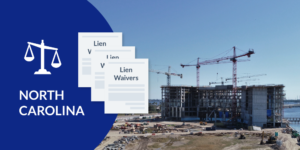
Lien waivers are an incredibly important aspect of the construction payment process. Nearly every project will require a contractor, sub, or supplier to execute a waiver in exchange for payment. And, although waivers are frequently exchanged, close attention should still be paid to the language contained therein. This is often overlooked and results in a potential claimant waiving more than intended.
However, this risk has been mitigated quite a bit in North Carolina with the passage of SB-219. Under this new legislation effective March 1, 2022, broad waivers exchanged for progress payments will be limited to the amount of payment that is actually received.
The current state of lien waivers in North Carolina
There are only 12 states that regulate the form and content of lien waivers in the US. In all other states, parties are free to use their own language on lien waivers. North Carolina falls under the latter. The issue with these “unregulated” lien waivers is that many times there is language included that can waive more lien rights than intended — or even other rights.
An additional wrinkle to the waiver process in North Carolina is the ability to waive future lien rights prior to performance — well, to an extent. Currently, waiving lien rights through the terms of the contract, (i.e. the use of “no-lien clauses“) is prohibited under NC Gen. Stat. §44A-12(f):
“…an agreement to waive the right to file a claim of lien on real property… or an agreement to waive the right to serve a notice of claim of lien on funds… which agreement is made in anticipation of and in consideration for the awarding of any contract… for the making of an improvement upon real property… is against public policy and is unenforceable.”
But note the phrase “in anticipation of and in consideration for the awarding of any contract.” This means that once the project begins, there is nothing preventing a contractor from waiving all their lien rights from that point forward.
Dive deeper: Should You Sign That Lien Waiver?
Overly broad lien waiver protections effective March 1, 2022
On January 26, 2022, North Carolina Governor Roy Cooper signed Senate Bill 219 into law.
This bill contains a number of different legislative changes. These include changes to the licensing requirements for land surveyors, additional requirements for public design-build contracts, determining prevailing parties for the purposes of attorney fees, and more.
However, there is one section of this bill that is of particular importance for North Carolina contractors and subs that limits the enforceability of lien waivers in certain situations.
Bill overview
- Title: NC Senate Bill 219
- Sponsor(s): Sen. Tom McInnis (primary sponsor) & Sen. Chuck Edwards
- Effective Date: March 1, 2022
With this new legislation, North Carolina adds a new section under Chapter 22B: Contracts Against Public Policy, which reads as follows:
Waiver of liens or claims as a condition of progress payment invalid.
(a) Provisions in lien waivers, releases, construction agreements as defined in G.S. 22B-1(f)(1), or design professional agreements as defined under G.S. 22B-1(f)(5) purporting to require a promisor to submit a waiver or release of liens or claims as a condition of receiving interim or progress payments due from a promisee under a construction agreement or design professional agreement are void and unenforceable unless limited to the specific interim or progress payment actually recevied by the promisor in exchange for the lien waiver.
(b) This section does not apply to the following:
(1) Lien waivers or releases for final payments,
(2) Agreements to settle and compromise disputed claims after the claim has been identified by the claimant in writing regardless of whether the promisor has initiated a civil action or arbitration proceeding.
What does this mean for NC contractors?
This is a welcome step by the North Carolina Legislature for contractors. Many contractors, subs, and suppliers are required to execute unconditional waivers in exchange for progress payments.
Unfortunately, this is a risky proposition, since the potential lien claimant may be unintentionally waiving payment for disputed claims or change orders that were executed prior to the waiver. That “through-date” contained on most progress payment waivers is both a blessing and a curse. With these new protections in place, the effectiveness of such waivers will be specifically limited to the amount of payment actually received, even if the waiver explicitly states that the party is waiving any and all claims up to the through-date.
But keep in mind that these protections are limited. The legislation carves out two specific exceptions to this rule that must be taken into account.
First, this does not apply to waivers made in exchange for final payment. This makes sense, as project stakeholders need some sort of reassurance that no claims will be filed later on after final payment has been made.
The other exception is in regards to settlement agreements. Most payment issues don’t reach the courts; many of them are hashed out between the parties before it reaches that point. This second exception takes such agreements into account. However, this could also be used improperly as a defense. Those looking to enforce these broad waivers may argue that it was merely a product of a settlement agreement or compromise of an existing dispute.
In any case, although this is good news for the NC construction industry, it doesn’t mean contractors can let their guard down. The full extent of these protections, and how the courts will deal with contractual and/or waiver language aiming to circumvent this new legislation is still up in the air.
For now, it’s still important to review the terms of your lien waivers carefully. And, whenever possible, use a conditional waiver to ensure you preserve your lien rights.